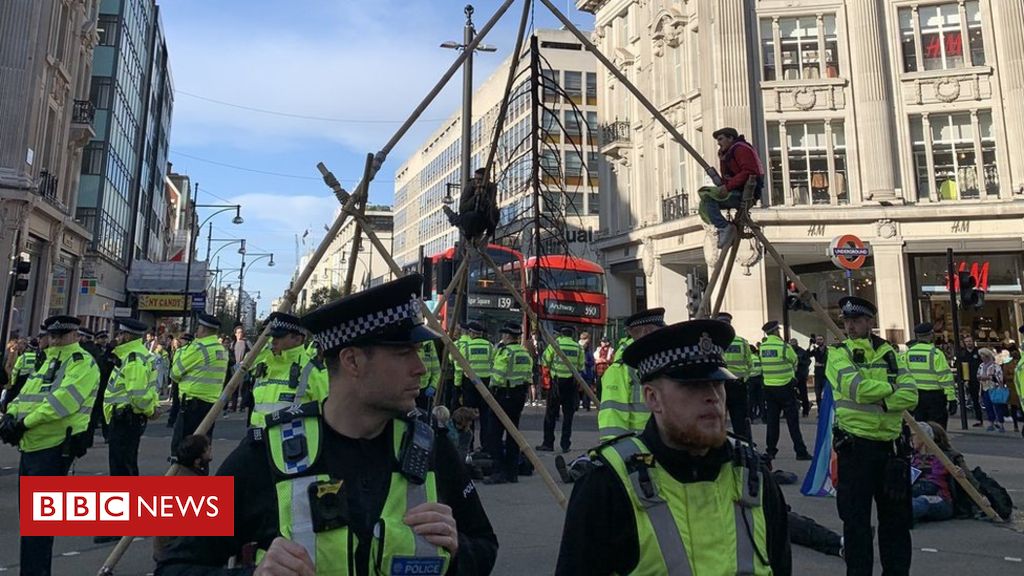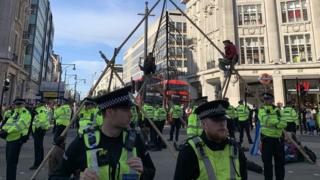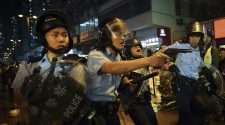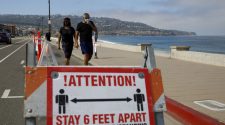Image copyright
Nathan Williams/ BBC News
Extinction Rebellion has won a High Court challenge against the Metropolitan Police over a London-wide ban on protests.
The police imposed a four-day ban last month, prohibiting two or more people from the group taking part in protests dubbed the ‘autumn uprising’.
However, judges have ruled that the move was “unlawful” and officers had no power to impose it.
Lawyers for the group described the police action as “hastily imposed”.
They say the Met Police now faces claims for false imprisonment from “potentially hundreds” of protesters.
The Met had argued the ban was the only way of tackling disruption caused by protests.
It has said 1,832 people were arrested during the demonstrations, with more than 150 charged with offences.
- What does Extinction Rebellion want?
- Extinction Rebellion protesters defy police ban
During 10 days of protests beginning on 7 October, Extinction Rebellion activists urged the government to do more to tackle climate change.
They shut down areas around Parliament and the Bank of England, and targeted London City Airport.
Police had tried to restrict protesters to Trafalgar Square, under Section 14 of the Public Order Act.
However, the ban was lifted four days later, with officers saying that it was no longer necessary because the series of protests, dubbed the ‘autumn uprising’, had ended.
During the court hearing, Phillippa Kaufmann QC, for Extinction Rebellion, told the court the move was “wholly uncertain, an abuse of power and irrational”.
‘Not a public assembly’
Announcing their judgement on Wednesday, Lord Justice Dingemans and Mr Justice Chamberlain said the Met had no power to impose the ban.
Lord Justice Dingemans said: “Separate gatherings, separated both in time and by many miles, even if co-ordinated under the umbrella of one body, are not a public assembly within the meaning of… the Act.
“The XR autumn uprising intended to be held from October 14 to 19 was not therefore a public assembly… therefore the decision to impose the condition was unlawful because there was no power to impose it under… the Act.”
However, the judges noted there are powers within that act which may be used lawfully to “control future protests which are deliberately designed to ‘take police resources to breaking point”‘ – one of Extinction Rebellion’s aims.
Responding to the ruling, Extinction Rebellion UK tweeted “we won’t be silenced”.
Lady Jones called the Extinction Rebellion victory “historic” shortly after the ruling.
Speaking in a Facebook Live broadcast outside the court, she said: “The police can over-step the mark. The police are getting more and more strong powers that they are misusing – and that’s absolutely unacceptable.”
Ms Lucas described it as “brilliant news” on Twitter.
Jules Carey, a solicitor representing protestors, said the ban was “hastily imposed” and “erratically applied”.
He said: “The police have powers to impose conditions to manage protests but not to ban them.
“This judgement is a timely reminder to those in authority facing a climate of dissent – the right to protest is a long-standing fundamental right in a democratic society that should be guarded and not prohibited by overzealous policing.”



















